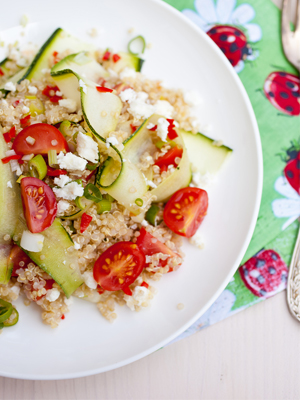For some, it’s the animal cruelty they have a hard time stomaching. Others may be looking to lose weight or improve their health. Whatever your reasons, if you’ve been thinking about going vegetarian, here are a few things to keep in mind.
Have Your Reasons
As a vegetarian “ especially a new vegetarian “ be prepared to answer the question, Why? Having to explain your new vegetarian lifestyle, whether to family and friends or to total strangers, can be intimidating. To avoid looking foolish, make sure that you are well informed and that you fully understand why you have decided to become a vegetarian. This is also very important on a personal level. Fully understanding why you wish to switch to plant-based diet will not only make the experience easier but also much more meaningful.
Go Meat-Free Slowly
If you’re a steak-loving carnivore, cutting meat out of your diet completely can be tough to say the least. Instead, start by phasing out your least favorite meat first and give yourself a couple of weeks to adjust before continuing on. Think you can live without pork? Don’t think you’ll miss that fish? Start with those. Successfully eliminating one thing at a time is far more encouraging than trying to quit cold turkey and, often, failing.
Find New Protein Replacements
Becoming vegetarian isn’t just about giving up meat. According to The Vegetarian Society, women aged 19 “ 49 require 45 grams of protein per day. When you eliminate meat, a major source of protein, from your diet, it is important to find suitable replacements. Before dedicating yourself to vegetarianism, experiment with chickpeas, tofu, nuts, whole grains, beans and lentils. All of these foods are high in protein and will likely become the staples of your vegetarian diet. If none of these foods appeal to you, perhaps you may need to reconsider becoming a full-fledged vegetarian.
Talk to Other Vegetarians
Even the shyest of so-called vegheads will love an opportunity to talk about their vegetarianism! Whether this means swapping veggie recipes, sharing much-loved restaurants or comparing common vegetarian experiences, having another veghead friend, family member or coworker can be a great support system. Having someone to attend vegetarian cooking classes with or flip through the latest issue of Vegetarian Times with will get you excited about your newfound vegetarianism and make it all the more fulfilling!
Get a Nutrition Assessment
So, you have finally made it through the first week, month and year. At this point, it is important to see a nutrition specialist to ensure that you are healthy. While maintaining a healthy vegetarian diet is normally quiet easy, nutrient deficiencies can occur. A nutritionist will evaluate your typical daily menu and can even test to make sure your protein, B12, calcium, iron and zinc levels are all on track. If one or another is low, he or she can suggest ways of improving your intake.










Comments